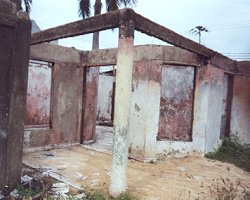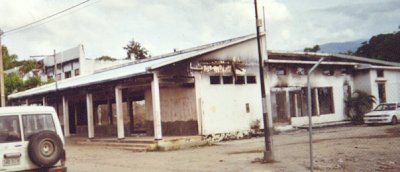

|
New Plymouth, March 2001.
THE AIR OUTSIDE DARWIN AIRPORT is hot, like Dili, but there is no close tropical smell. There are no small, thin people; in fact there are hardly any people at all. There is only one soldier and she doesnít have a rifle. Everything feels quiet, muted and big.
I had an overnight stopover in Darwin. What I experienced over a few evening hours were European and American tourists in fashion tramping shorts, boots and little tops that, for a woman or a man, would not be enough cover in Timor. These thirtysomethings purposefully move between restaurants, watch soccer on the pub TV, play pool, yack it up around the pool (a pool!) and deliberate over which it will be: a Victoria Bitter or an XXXX.
I canít get over how perfectly paved the streets are and very street has streetlights. There are public trash bins that somebody empties. Thereís a Sizzler steakhouse. There is a huge banner promoting Les Miserables. My backpackersí room is air-conditioned. There is hot water in the tap Ö imagine that: a warm shower. I guess Iíll need warm water in a refrigerated room.
What do I find so overwhelming about this picture? Itís the wealth. There is no tiny woman squatting next to a mat trying to sell another cup of dried beans.
Back in NZ, everyone is saying how warm it is but itís not. In Timor you wear clothes for decorum and to keep the sun or the mosquitoes off. Never to keep warm, even in the evening, even at midnight.
I have a new appreciation of the NZ the postal service. In East Timor there is no home delivery. It once took me 62 days to receive a letter addressed to me at the Dili post office sent from Darwin, an hour and a half away.
What else is different? Hardly anyone smokes. Iím not compelled to drink three liters of water. There are no roosters crowing and no pigs squealing. No one says, ďHello, Mister. Where are you going?Ē There are no derelict buildings.
Almost everyone I talk to asks if itís good to be home. I feel reluctant to say yes because it implies Iím glad to be away from East Timor. Iím not.
I rang a friend in Dili who had recently spent ten days in Darwin. We talked about how strange it feels going away. Trying to pin it down, she said everything outside East Timor seems so trivial.
 This triviality has to do with our wealth, the padding, the feeling we have a cushion around us. It has to do with the fact we are not scraping out our livelihoods with an iron bar or a machete.
This triviality has to do with our wealth, the padding, the feeling we have a cushion around us. It has to do with the fact we are not scraping out our livelihoods with an iron bar or a machete.
Much of the standard of living that we gird ourselves with is aimed at separating us from the struggle for survival. It not only provides us with creature comforts; it also distracts us from death. I feel it also distances us from living in the present. We are future oriented because we have reason to believe weíre going to live to see next year.
Since I came home, I have found it difficult to settle. I am reluctant to answer superficial questions about East Timor. The problem is that I had never before had friends who were so poor and Iíve found that really affecting. I had lots of good times, but I donít want to tell clever travel stories.
I feel immensely attracted to East Timor and am hatching plans to return. In another couple of years it will be a wonderful tourist destination. Plan to go there, I recommend it. But at the moment it's a little rough. Outside of Dili and Baucau, there is no accommodation. Suai has two eating places.
It's a shame that when someone asks me about East Timor my thoughts sail right passed my warm friends, bike rides up the beach, the lovely warm evenings and the beauty of the land. I seem to go straight to the end and think of three words: messy, poor and tortured.
Think of the trial of getting a family of eight organised and packed in the car to go on a weekís holiday. Then think of half a million people, with little in common and whoíve been living under marshal law for 25 years, who have had little if any formal training. Imagine trying to get these people organised and acting as well behaved citizens for the ďcommon goodĒ. Yes, itís messy.
 Forget the heated towel rail, your closet of clothes, your VCR, your car, your water heater, washing machine, telephone, the movies, the pub, your pay packet or your dole. Instead, consider having to buy rice and an eggplant over buying a school uniform. Many children in East Timor donít go to school because they canít afford the pencil and notebook. Many schools have no chairs or desks, even for the teacher. Yes, these people are poor.
Forget the heated towel rail, your closet of clothes, your VCR, your car, your water heater, washing machine, telephone, the movies, the pub, your pay packet or your dole. Instead, consider having to buy rice and an eggplant over buying a school uniform. Many children in East Timor donít go to school because they canít afford the pencil and notebook. Many schools have no chairs or desks, even for the teacher. Yes, these people are poor.
Think of a lively party of 50 friends and acquaintances eating, drinking, having a dance and a laugh. Then imagine everyone one of those people, including yourself, having at least one close relative who has been murdered, or who disappeared and you never found out what happened to her. Then think of a whole nation of these people. Yes, these people are tortured.
Yet people find it in themselves to smile and carry on.
It seems a clichť to say every person needs the assurance they can eat healthy food, drink safe water, get treatment when their family is sick, have a decent place to live, have work that is valued and live without physical threat. But people don't have these things. Without them, everything else is trivial.
